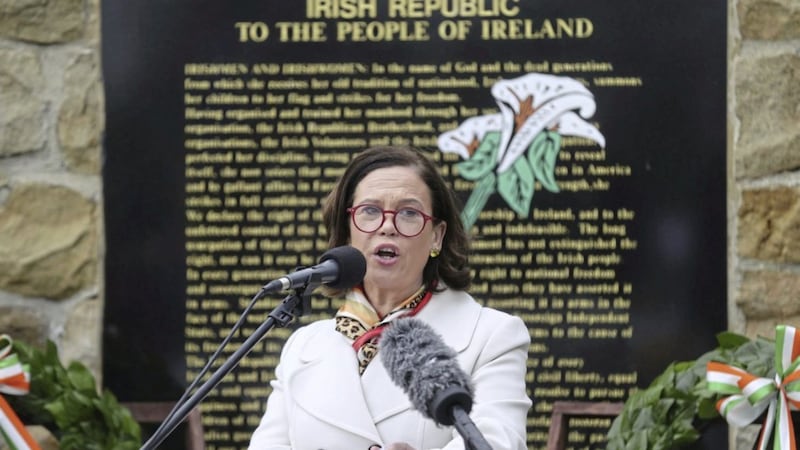There are times when I wonder if Mary Lou McDonald really is congenitally tin-eared and tone-deaf when it comes to unionism; or if she just enjoys winding them up.
I’ve always thought—and it’s not a popular opinion within some sections of unionism or loyalism—that Martin McGuinness was probably the only key player within Sinn Féin who tried to understand how unionists think. It may have been something to do with the relationships he built with both Ian Paisley and Peter Robinson, but I always had the sense that he made a serious and considered attempt to see the world from a unionist perspective.
Gerry Adams was also tin-eared and tone-deaf in his dealings with unionism, but that’s because he really didn’t give a damn about unionists. His ‘break these bastards’ comment at a Sinn Féin supporters’ meeting in November 2014 came as no surprise to anyone, because he had never ever tried to hide his opinion of unionists. His nod of approval to the appointment of Martina Anderson as Sinn Féin’s first director of unionist outreach over 15 years ago was, as he would have known it would be, a calculated insult. But he went ahead with it anyway.
Unionism didn’t know very much about McDonald when she succeeded Adams as Sinn Féin president in February 2018. Some breathed a sigh of relief, believing she would never have the sort of clout he possessed at national and international level and, consequently, wouldn’t be able to take Sinn Féin much further electorally. Indeed, DUP and UUP politicians told me that the pairing of McDonald and Michelle O’Neill was probably the “best news unionism has had for years.”
But McDonald has become a problem for them, raising the concern that she is the ‘Shinner’ who will take the party to places that Adams could only dream of. Could the strength of her potential mandate in 2024/25 be enough to reassure Irish voters who, in recent opinion polls, while hinting they still support unity, have set limits to their support? Could she persuade pro-EU (but unity agnostics) supporters in NI to trust her in a border poll? Might she find herself powerful enough within just a few years to persuade the British and Irish governments to deliver that poll?
She had a very rocky electoral start when she succeeded Adams but has now eclipsed all of his political/electoral successes. Yet she is less sure-footed when it comes to her dealings with unionism. Take last Sunday, for example. At a moment when unionism has been unsettled by the protocol (and that unsettling encompasses all sections of the pro-union community, although many would still be keener to find a compromise than provoke an unwinnable fight with Boris Johnson or collapse the assembly altogether) it struck me as extraordinary that she would use Milltown Cemetery as the platform to invite unionists to help Sinn Féin reach its objective of achieving a united Ireland.
She knows the importance of Milltown to republicans when it comes to commemorating 1916; and she also knows its continuing importance to the modern IRA. So why choose that location as an outreach to unionism in the middle of an election campaign? She must have known the offence it would cause. She must have known her invitation would be greeted with silence, even from that section of small-u unionism which has indicated a willingness to listen to the possible case for unity.
She also knows that Sinn Féin and the DUP have proved incapable of building a genuine working partnership (apart, perhaps, from a very brief period in 2007/8). The mountain of challenges they jointly faced in 2007 is higher now--with most of the original problems still unresolved. Sinn Féin pulled down the executive in January 2017 and it wasn't rebooted until January 2020. The DUP pulled it down again in February and there are no guarantees it will ever be rebooted.
So why, given that sort of background, does McDonald even pitch the idea of unionism walking the journey to Irish unity with them? She must know it's an utterly fatuous argument to make at this point. And she must know that the vast majority of unionists (irrespective of which party they support, or whether they view themselves as big-U or small-u) would be very uncomfortable embarking on any journey with Sinn Féin.
I've spoken at a number of Sinn Féin-organised events on their proposed 'new' Ireland project, including one in Dublin just before she succeeded Gerry Adams (she was on the platform with me), and explained why I thought they were probably the worst party to try and persuade unionists of the merits of Irish unity. That remains my view.
Crucially, before trying to go hand-in-hand with unionists on the unity journey, Sinn Féin needs to drill down into the findings of recent polling in the south and start addressing the concerns of people there about the consequences of unity. And if it really does include unionism and unionists in its concept of a ‘new’ Ireland then perhaps it needs to do what McGuinness tried to do—understand our mindset, perceptions and concerns before issuing invitations to join them outside the United Kingdom.








